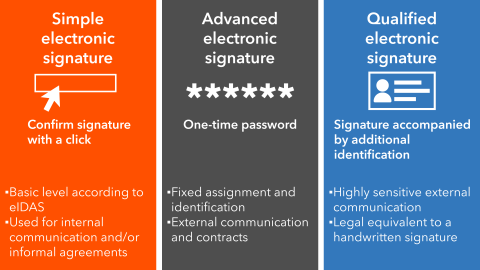Ensuring the legal compliance of your digital signature processes with RSign
Use RSign for efficient and compliant digital signatures that meet the eIDAS Regulation.
Experience the reliability of RSign for legally secured digital signatures that are fully eIDAS-compliant.
Legally valid electronic signatures in accordance with the eIDAS Regulation
RSign is in compliance with the pioneering legal framework for electronic signatures, both in the American and European context. In the USA, the ESIGN Act (Electronic Signatures in Global and National Commerce Act) defines the legal recognition of electronic signatures and creates a clear legal framework for digital transactions. In the European Union, the eIDAS Regulation (Electronic Identification and Services) governs the use of electronic signatures. RSign meets the requirements of both regulations, thus offering a legally compliant platform for electronic signing, ensures the legal validity of electronic signatures, and enables secure, paperless, and traceable transactions. Companies using RSign can rely on their digital signatures to meet the stringent requirements of legal guidelines.
Digital Signatures Compared: SES, AES, and QES simply explained
Electronic signatures have become a pillar of the digital business world. With three main types – each with its own unique characteristics and legal frameworks – they offer a versatile range of possibilities for the authentication of digital documents.
Simple Electronic Signature (SES)
The basic variant of electronic signatures – known as Simple Electronic Signature (SES) – is a fundamental but widespread form of digital authentication. It encompasses the digital reproduction of a handwritten signature in a document like Word, as well as consent to agreements sent by email.
Advanced Electronic Signature (AES):
The Advanced Electronic Signature (AES) represents an evolutionary development in the world of digital signature. It offers increased security beyond the basic functions of the Simple Electronic Signature, such as the unique connection of the signature to the document and verifiable identity attributes of the signer.
A practical example of use is the application of AES when signing contracts via secure online portals, as offered by RSign, to meet legal and security requirements.
Qualified Electronic Signature (QES)
The qualified electronic signature meets the highest legal requirements, equivalent to those of a handwritten signature and demanded by the legislature. QES is based on advanced technologies such as the use of qualified certificates and requires strict identity verification of the signer. In practice, qualified signatures are increasingly being replaced by alternative solutions or, after risk assessment, by AES due to their complexity and high effort involved.
An example of the use of QES would be the signing of official documents or contracts in compliance with legal regulations.
Contact us

In many companies, the "advanced digital signature" proves to be an effective and legally valid solution for numerous applications. This type of digital signature offers a balanced ratio between security and legal validity, making it an ideal choice for various business processes.
The introduction of the advanced digital signature in your company greatly facilitates the digitisation of contracts, approval processes, and HR documents, contributing to increased efficiency.
RSign not only ensures the highest security standards but also promotes the efficiency of your business processes, leading to increased productivity. Contact us to learn how RSign can support your company!
